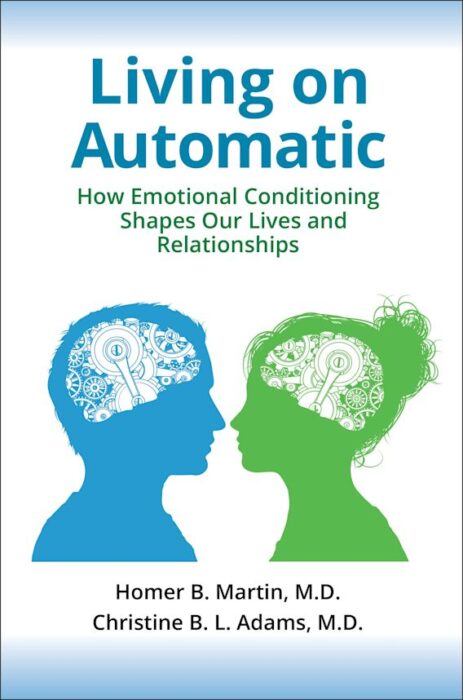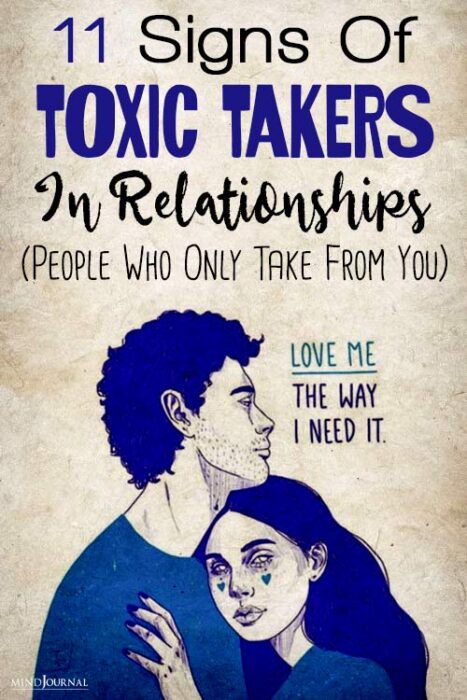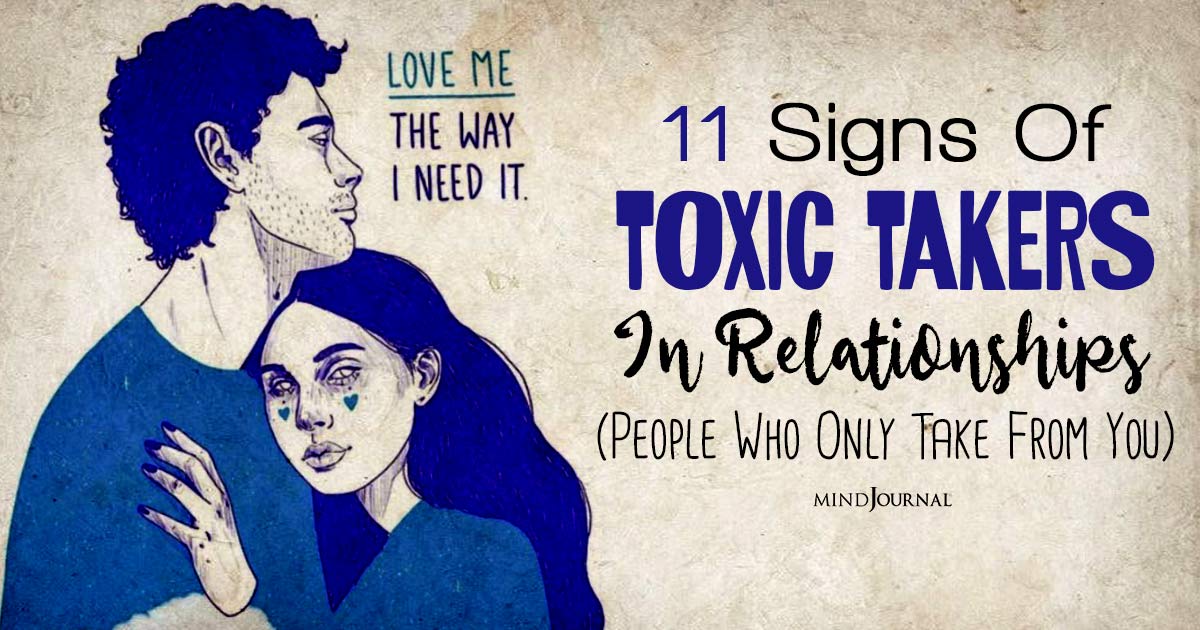There are certain people who only take from others, and choose to be entitled and arrogant about it for their whole lives. Such toxic takers or self centred people demand and expect too much from others, whilst doing nothing in return. This article is going to talk in detail about the signs of people who only take and give nothing back.
KEY POINTS
- People who demand too much from others have high self-esteem with anxiety and are inept at self-care.
- Takers experience a higher mortality rate than those in give-and-take irelationships.
- Expecting too much from others is learned in early childhood. It becomes a fixed aspect of personality.
People who expect too much from others may be labelled narcissistic, expecting unstinting admiration and caretaking by others. The Oxford Learner’s Dictionary defines narcissism as “having an excessive preoccupation with oneself and one’s own needs… often at the expense of [understanding] others [needs].”
We may view such people as getting all the goodies in relationships because they call the shots and get their desires and needs met by others. But there are downsides for people who take too much from others in relationships. There are also other attributes that go along with being takers.
Related: 9 Tactics Through Which People Take Advantage Of You
People Who Only Take From You: 11 Signs Of Toxic Takers In Relationships
1. Arrogant Attitude
Takers arrogantly expect others to give to them as if this were the purpose of other people in relationships, cite Martin and Adams. They are not obsequious about accepting help. They are ungrateful. Rarely are they thankful for assistance.
They feel entitled to all they get from others, and they usually want more. They do not expect to reciprocate by giving to others. Their focus is only on receiving. This leaves their relationships lopsided.
2. Inflated Sense of Self-Worth
Somewhat paradoxically, people expecting to be gratified by others may have high self-esteem. They often believe they are wonderful people and highly accomplished, even though they may be ungifted and unskilled, with few endeavours even attempted, find Martin and Adams.
3. Focus on Personal Wants
People who excel at taking support from others are highly focused on personal desires, similar to a horse wearing blinders. They often have little perspective on what other people need or want.
According to Dambrun and Ricard, their happiness and emotional stability fluctuate and are not steady with this enduring personal focus.

4. Little Consideration of Others
Blair finds that, often, self centred people have and demonstrate little empathy for others. This explains their lack of consideration for others’ needs and wants and their poor responsiveness to others’ distress.
5. Expect Others to Solve Their Problems
Takers are good at absolving themselves of agency in solving their own problems. Why try to fix something on your own when you can expect and get another person to step up and do it for you?
Related: 9 Types of Toxic People That Will Rob You Of Your Happiness
6. Assume Little Responsibility
Takers are often irresponsible and exhibit little responsibility, both for themselves and for others. They project responsibility onto other people who are especially good at taking up the slack for them.
For example, they may expect a spouse to be totally responsible for the children while they maintain a hands-off approach toward child-rearing.
7. Inept Feelings Toward Self-Care
Because self centred people are so good at eliciting care from others, they are lousy at self-care. They may feel anxious and inept at the idea of doing things that care for themselves.
8. Higher Mortality Rate
Chen et al. studied all-cause mortality risk in people “disproportionately receiving social support––[receiving] more social support than they gave.” They found higher mortality in this group when compared with people who both give and take emotional support.
They speculated that higher “support from others may leave individuals feeling indebted to and dependent on others…” Such “…low levels of perceived control…” are often linked to higher risk of many physical diseases, especially cardiovascular illnesses. Pathological emotional taking is hazardous to survival when compared with people having more balanced reciprocity in their relationships.
9. Relish Dependency on Others
People good at taking do not shun others’ help, nor are they independent in their self-directed actions. They like being in a dependent role in which others dispense emotional and physical care to them.

10. Early Learning
Martin and Adams discovered that children demonstrated self-absorbed, taking traits by age three. Commonly, parents excessively catered to such children, both anticipating problems and solving problems the children encountered, instead of allowing children to problem-solve on their own.
These children manifest conduct problems at young ages—throwing tantrums and being aggressive when they do not get their way.
Related: How To Leave A Narcissist: 6 Powerful Hacks
11. Psychological and Psychiatric Disorders
Addictions can occur in helpless, self centred people who feel and act helpless in relationship—substance abuse, gambling, and sexual addictions. Carter et. al compared normative youth with young people who abused substances.
They discovered the substance abusers exhibited higher levels of narcissism, entitlement, and egocentrism. In extreme instances, according to Blair, psychopathy, with an extreme lack of empathy for others, can occur in a minority of narcissistic, pathological takers.
Check out her website to see more blogs, podcasts and articles. Also, don’t forget to check out her amazing book, Living on Automatic: How Emotional Conditioning Shapes Our Lives and Relationships.

References:
Blair, R.J.R. (2013) The neurobiology of psychopathic traits in youths. Nature Reviews Neuroscience. 14, 786-799. Dambrun, M., Ricard, M. (2011) Self-Centeredness and Selflessness: A Theory of Self-Based Psychological Functioning and its Consequences for Happiness. Review of General Psychology, Vol. 15(2) 138-157. Martin, H.B., Adams, C.B.L. (2018) Living on Automatic: How Emotional Conditioning Shapes Our Lives and Relationships, Praeger (now Bloomsbury). The Oxford Learner’s Dictionary, Oxfordlearnersdictionary.com/us/definition/English/narcissism Carter, R.R. et al. (2012) Addiction and “Generation Me:” Narcissistic and prosocial behaviors of adolescents with substance dependency disorder in comparison to normative adolescents, Alcohol Treat Q, 30(2): 163-178.
Written By Christine B. L. Adams M.D. Originally Appeared On Psychology Today









Leave a Reply
You must be logged in to post a comment.